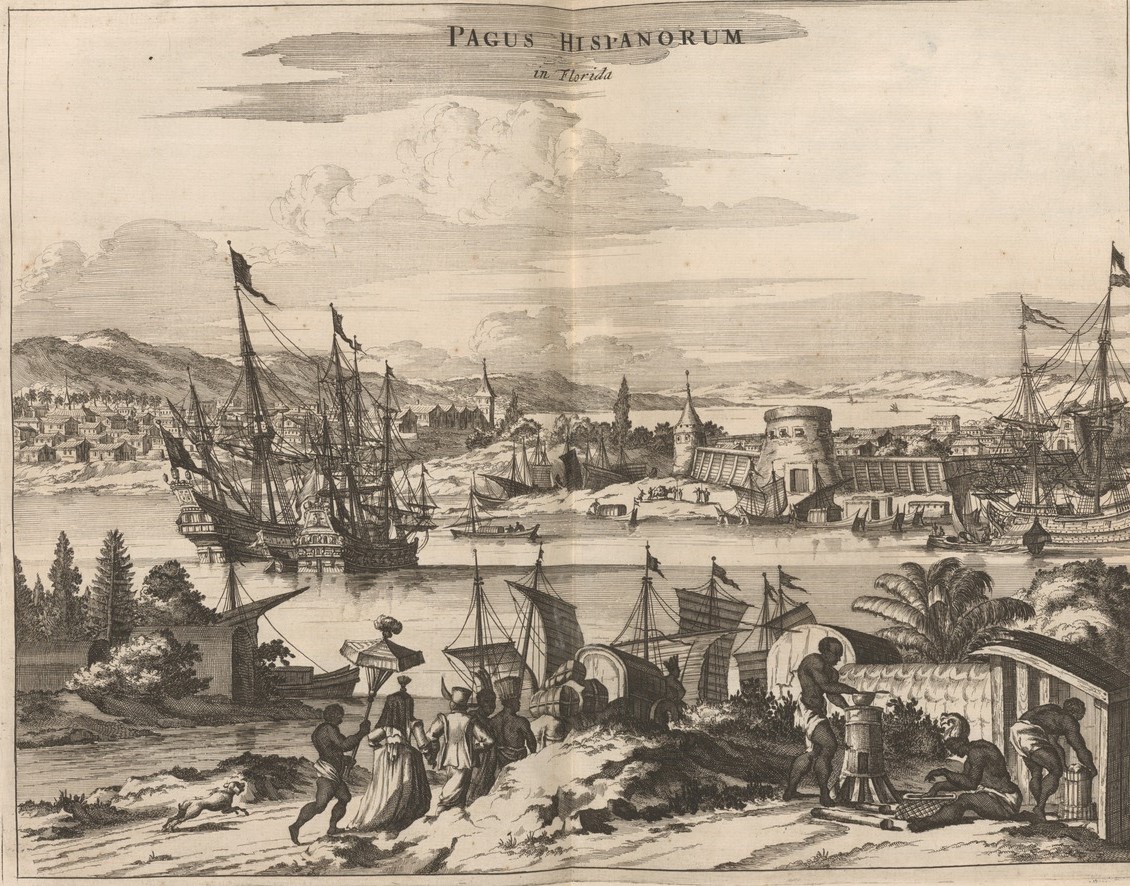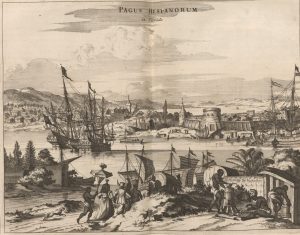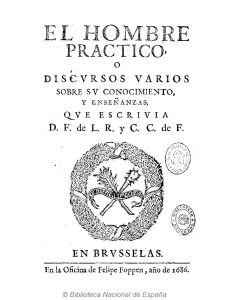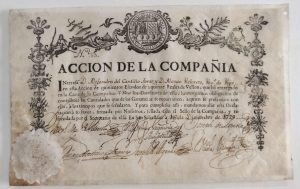
Reform or Perish: Theory and Practice of Reform in the Spanish World under the Early Bourbons
After a long career in the Spanish armies, most of it in Philip V’s personal guard, Antonio de Benavides was appointed governor of Spanish Florida in 1718. As a result of his successful negotiations with local indigenous groups, particularly the Apalachee, Muskogee and Yamasee, with whom he built alliances to resist British expansion, Benavides’s term as governor was prorogued twice. During the 16 years he ended up serving in Florida, he transformed the province’s defensive forces, building or re-building fortresses at St Augustine and San Luis (Tallahassee) and improving the organisation and training of both regular forces and militia units. He also made some significant improvements to the province’s finances. His successful tenure in Florida earned him promotions to Veracruz (1734-43) and Yucatan (1743-51). Upon his return to Spain he declined an appointment as Captain General of the Canary Islands, opting, instead for retirement in the archipelago, where he had been born.
In the Spanish world, the first half of the eighteenth century, especially during the reigns of Philip V (1715-1746), was a time of change. The Bourbon succession created opportunities for people and ideas who had been in the margins of Hispanic political culture to move into the mainstream. New ways of understanding the structure of the Spanish World, its politics and society emerged across the empire. A new way of thinking about monarchical authority transformed relationships between the king and his subjects.[1] Gradually, elements of what defined the ‘jurisdictional complexity’ of Spain’s ‘composite monarchy’ were transformed into the rudiments of an ‘administrative monarchy’.[2] These transformations were the work of both senior ministers in Madrid and other groups and individuals scattered across the Spanish world. Among the latter were men like Benavides, lower-ranking royal officials who spent large parts of their lives in various destinations in the Americas. Who were these men and how did they reshape the early eighteenth-century Spanish world?
Answering these questions is the main aim of this blog. We intend to offer a multi-layered image of the Early Bourbon period and its reformist agendas, from the perspective of individual actors. In the following posts, we will try to understand how the Spanish World was connected by individuals with divergent, and some times contradictory, ideas of what needed to be reformed in what they perceived as a fragmented and inefficient empire. Similar processes were underway around world, including in the Ottoman and Mughal empires.[3] But this first post has a more modest aim. It seeks to highlight the diversity amongst the agents of Early Bourbon reformism, the different meanings that ‘reform’ had at the time, and the specific role played by itinerant royal officials.
Trajectories of Reform
The Early Bourbon period is often depicted in popular culture, particularly in film and TV, as an extension of the simplistic and caricaturised image of a Philip V overwhelmed by his poor mental health. Yet, the first half of the century witnessed important political, economic and military transformations.[4] The viceroyalties of the Crown of Aragon were suppressed, while viceregal authority was strengthened in the Americas and a new viceroyalty was established in New Granada.[5] The traditional institutions of Spanish Atlantic trade were transformed or side-lined, and the first charted companies were established (Honduras 1714, Caracas 1728, Havana 1740, etc.). Similarly, military reform aimed at streamlining and professionalising the armed forces. The Early Bourbon Spanish world was neither a reflection of Philip V’s court, nor a homogeneous entity. Contrary to the image often presented today, an analysis of the life experiences of ordinary agents of reform unveils a vast, complex Spanish world, but one that was interconnected and integrated to such a degree that change reached even ‘isolated backwaters’ such as Florida.

Fictional view of St Augustine from John Ogilby’s 1671 America: Being the Latest, and Most Accurate Description of the New World
The life-path and reformist activities of Antonio Benavides were not exceptional, but historians have paid limited attention to itinerant officials such as him, whose lives took place in a succession of different sites of empire. Thus, their life-paths constitute an under-exploited opportunity to study the ‘Bourbon reforms’: a series of policies aimed at streamlining, or reshaping, the power structures of the Spanish Monarchy. We often tend to think of the Bourbon reforms as either a uniform programme of military, fiscal and administrative changes, or a set of ad hoc measures adopted in the face of war. Was there a shared, single understanding of what ‘reform’ meant and of why reforms were needed amongst the men who contributed to their design and implementation? Was there a single group and a coherent logic behind them?
In English, the word ‘reform’ is often associated with notions of gradual improvement or limited change, often linked to conservative or anti-revolutionary politics. Thus, the anglophone notion of reformism, as a moderate approach to transforming a political system, is inevitably opposed to the notion of radical change through revolution. Eighteenth-century processes of imperial transformation in ‘despotic monarchies’ (such as Spain, Portugal, or the Ottoman empire) have often been investigated from a perspective that emphasises these states’ traditionalism and inability to ‘modernise’. In the last decade, however, research into the linguistic and religious elements of some of these processes has stressed the importance of revising historiographical notions of reformism. [6] Studies stress the importance of the terms used by historical agents, such as ‘decadencia’ (decadence) and ‘práctica’ (practical knowledge), which are prominent in the Spanish case. Additionally, they highlight the importance of understanding how reformist discourse could be appropriated by specific social groups and networks to further their own interests.[7]

El hombre practico o discursos varios sobre su conocimiento y enseñanzas que escrivia D[on]. F[rancisco]. de L[os]. R[ríos]. y C[ordova]. C[onde]. de F[ernán Núñez]. Bruselas, 1686.
[The practical man or discourses on his knowledge and teachings written by Don Francisco de los Ríos y Cordova, Earl of Fernán Núñez. Brussels, 1686]
Around the globe, the eighteenth century was an age characterised by a diversity of ideas concerning the need to transform political systems. The emergence and popularisation of new political and social ideas gave way to a great diversity of reform projects. Thus, in studying Early Bourbon reformism we must consider competing interpretations of what reform meant. These ranged from a desired return to the pure confessionalist character of the Spanish monarchy, espoused by the likes of Pedro Portocarrero y Guzmán and Cardinal Luis Belluga y Moncada, to the rationalist reformulation of the governing institutions of the monarchy championed by Melchor de Macanaz and the group often referred to as the novatores. Among these multiple views of reform, there was also one that hoped for a restoration of Spain’s military might which was often championed and appropriated by Philip V and some of his closest advisers.[8] This view also became associated with a new group of ‘professional’ soldiers whose service during the War of the Spanish Succession and other campaigns of Philip’s reigns became a mechanism for social promotion and an avenue into local and provincial government. Antonio Benavides belonged to this group as did another itinerant provincial governor: Alberto Bertodano.
A veteran of Flanders, where he had lost an arm, Bertodano was appointed governor of Cumana, in the north-eastern corner of present-day Venezuela, in 1707. He spent 5 years there, during which he continued to distinguish himself as a military commander, improving the discipline and training of both regular and militia forces; he repaired and modernised the fortresses in Cumana and Araya, attending not only to defensive considerations, but also to the well-being of the troops. Bertodano’s efforts in Cumana were rewarded with successive appointments as interim governor of Caracas (1715-16) and Puerto Rico (1716-20) and as governor of Cartagena de Indias (1720-24), where he settled and lived until his death.
Benavides’s and Bertodano’s preoccupation with military preparations and training evince a militaristic vein of Early Bourbon reformism which was underpinned by a set of ideas about the nature of royal authority in Spain, the need to strengthened it across the empire, and the social relationships on which it should be based. The experiences of men like Benavides and Bertodano, and the locales where their lives unfolded, helped shape their own notions of what reform entailed and what needed to be reformed within a broader, shared frame of reference. As was the case for other empires, Early Bourbon reformism reflected a plurality of understandings of what needed to be reformed: some views emphasised innovation, i.e. introduction of new ideas and practices; others repairing existing dynamics and institutions that had fallen into ‘decay’; while, yet others encouraged the emulation of values and ideas imported from other empires.[9]
Crossing life-paths
This blog presents some of the results of our research into the lives and careers of three itinerant royal officials: Alberto Bertodano y Navarro (b. Tudela 1660 – d. Cartagena de Indias ca. 1736); Antonio Benavides (b. La Matanza de Acentejo 1678 – d. Tenerife 1763); and Antonio José Álvarez de Abreu (b. Santa Cruz de la Palma 1688 –d. Madrid 1759). The life-paths of these three men crossed each other in multiple ways, places, and moments. Their origins and backgrounds, the places where they served, the honours they received, and their family strategies intersected one another. All three were characterised by their mobility across the Atlantic Ocean, and by how their networks articulated local, imperial, and trans-imperial relationships.
Earlier in this post, we touched on the lives of Antonio Benavides and Alberto Bertodano, highlighting their shared military background. Álvarez de Abreu’s trajectory differed from the two other men in that he was a jurist, rather than a soldier. He shared with Benavides the fact they had both been born in the Canary Islands during the reign of Charles II, but left the archipelago at a young age and their careers really kicked off in the Iberian Peninsula in the early years of Philip V’s reign. Benavides began his professional life as a soldier in Flanders, as did Bertodano; later, they both served in the War of the Spanish Succession. Benavides saw extensive action during this campaign, from Portugal to Catalonia; he participated in some of the most important battles such as Zaragoza and Villaviciosa. Meanwhile, most of Bertodano’s actions took place in or around Andalusia; most prominently, he fought against the English landing in Puerto de Santa María. Álvarez de Abreu, in the meantime, studied Law at the Universities of Salamanca and Alcala before establishing himself as a lawyer in Madrid.
As provincial governors in the Americas, Bertodano and Benavides faced some similar challenges and opportunities. Besides the military concerns mentioned earlier, they were also involved in the implementation of fiscal and commercial reform. They were also involved in trans-imperial commerce and smuggling, which was technically illegal but crucial to the survival of many of Spain’s more isolated provinces. While in Cumana and Caracas Bertodano was linked to trade with Curacao and Martinique; in Cartagena de Indias he was suspected of dealings with the British asiento agents. Benavides was no stranger to British trade –a lifeline to Florida’s economy and an important presence in both Veracruz and the Yucatan. Spanish American trade and foreign contraband were also central to Álvarez de Abreu’s career, from his first appointment to Caracas, with the task of facilitating the activities of the short-lived Honduras Company -one of the first privileged trading companies established by the Bourbons- and reporting on the possibilities of increasing trade between Spain and the province, to his time as a judge in the Trade House in Cadiz, and later as a member of the Council of Indies in Madrid. Bertodano and Alvarez de Abreu sailed together from Cadiz to Caracas in 1716; and the time they spent together in Venezuela was marked by their involvement in the confrontations between local elites and the Honduras Company. Later in life, Álvarez de Abreu played an important role in the creation and consolidation of the much more successful Caracas Company; meanwhile, in retirement, Benavides became an active proponent of a Canarian Company to further trade between the archipelago and South America.
A share in the charted Caracas Company. Madrid, 10th December 1729.
Benavides’s interactions with native peoples in Florida were perhaps more prominent than Bertodano’s engagements with the indigenous peoples of Piritu and the Orinoco basin, but both were strongly linked to renewed missionary efforts, particularly by the Franciscans. Ecclesiastical reform was also a central concern of Álvarez de Abreu, a proponent of placing indigenous parishes under the care of secular, rather than regular clergy. Álvarez de Abreu and Benavides had one more thing in common, they were both rewarded for their services to the Spanish crown with titles of nobility: Benavides was granted the title of Marqués del Apalache, for his role in improving the defences of St Augustine, while Álvarez de Abreu was made Marqués de la Regalía, for writing a legal treatise in which he established Philip V’s right to profit from the income from vacant bishoprics in the Americas.
By studying the lives and careers of these itinerant royal officials, highlighting their interconnections and the significance of the locales where they served, we aim to understand the contexts, ideas, and dynamics of the multiple strands that contributed to Early Bourbon reformism. Following Lambert and Lester, we believe that the ‘imperial careers’ of itinerant royal officials ‘are worthy of further study not necessarily because imperial careerists’ own comparative insights give us more objective view of colonial relations, but because their histories-indeed their life geographies- constituted meaningful connections across the empire in their own rights’.[10] Our three subjects and their stories were associated to the military, commercial, ecclesiastical and administrative reform of a fragmented monarchy. A cross-study of their careers and networks highlights the range of social groups, ideas, and individual experiences that collectively shaped Early Bourbon reformism on both sides of the Spanish Atlantic.
[1] (Vázquez Gestal 2013; Magallón 2016; Premo 2017)
[2] (Fernández Albaladejo 1992)
[3] (Malik 2003; Tuck 2008; Anscombe 2010; Yaycioglu 2018)
[4] (Kuethe and Andrien 2014, 1–194)
[5] (Giménez López 2015; Eissa-Barroso 2016)
[6] (Malik 2003)
[7] (Magallón 2016)
[8] (Morán Turina 1988)
[9] For a similar approach for the Ottoman reformism see (Tuck 2008). On emulative practices of reformism in the Spanish Empire during the second half of the eighteenth century (Paquette 2008)
[10] (Lambert and Lester 2006, 2)
Bibliography
Anscombe, F. F. 2010. “Islam and the Age of Ottoman Reform.” Past & Present 208 (1): 159–89.
Eissa-Barroso, Francisco A. 2016. The Spanish Monarchy and the Creation of the Viceroyalty of New Granada (1717-1739): The Politics of Early Bourbon Reform in Spain and Spanish America. Brill.
Fernández Albaladejo, Pablo. 1992. Fragmentos de monarquía: trabajos de historia política. Alianza.
Giménez López, Enrique. 2015. Entre Marte y Astrea: la Corona de Aragón en el siglo XVIII. Instituto Alicantino de Cultura Juan Gil-Albert
Kuethe, Allan J., and Kenneth J. Andrien. 2014. The Spanish Atlantic World in the Eighteenth Century: War and the Bourbon Reforms, 1713-1796. Cambridge University Press.
Lambert, David, and Alan Lester. 2006. “Introduction: Imperial Spaces, Imperial Subjects.” In Colonial Lives across the British Empire: Imperial Careering in the Long Nineteenth Century, ed. by D. Lambert and A. Lester. Cambridge University Press.
Magallón, Jesús Pérez. 2016. “Del Héroe Discreto al Hombre Práctico: Un Cambio de Modelo.” Romance Notes 56 (3): 423–31.
Malik, Jamal. 2003. “Muslim Culture and Reform in 18th Century South Asia.” Journal of the Royal Asiatic Society 13 (2): 227–43.
Paquette, Gabriel. 2008. Enlightenment, Governance, and Reform in Spain and Its Empire, 1759-1808. Plagrave Macmillan.
Premo, Bianca. 2017. The Enlightenment on Trial. Ordinary Litigants and Colonialism in the Spanish Empire. Oxford University Press.
Tuck, Christopher. 2008. “‘All Innovation Leads to Hellfire’: Military Reform and the Ottoman Empire in the Eighteenth Century.” Journal of Strategic Studies 31 (3): 467–502.
Morán Turina, José Miguel. 1988. “Felipe V y la guerra: la iconografía del primer Borbón.” Cuadernos de arte e iconografía 1 (1): 187–200.
Vázquez Gestal, Pablo. 2013. Una nueva majestad: Felipe V, Isabel de Farnesio y la identidad de la monarquía (1700-1729). Fundación de Municipios Pablo de Olavide / Marcial Pons Historia.
Yaycioglu, Ali. 2018. “Guarding Traditions and Laws—Disciplining Bodies and Souls: Tradition, Science, and Religion in the Age of Ottoman Reform.” Modern Asian Studies 52 (5): 1542–1603.


